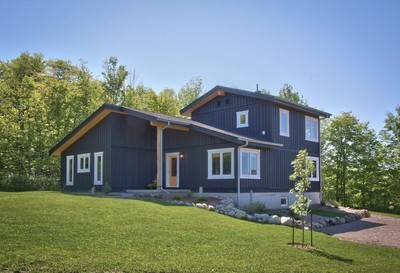
The broader factory-built home industry of the present and future are definitely not the mobile home industry of pre-June 15, 1976.
For the progress that’s been made, the factory-built home industry is still facing perception and narrative challenges with the public and the media.
When combined with the rising demands of current and future housing demand, each of these challenges need to be handled head on if the industry is to thrive in times where it is designed to shine.
So, what does that future look like?
A recent article by John McManus on Builder Online addresses this question and provides a view of the future and how Hybrid Prefab homes fit into it.
An important question is asked: Is the home of the near future (2020) capable of being the home of the long-term future (2050)?
Hybrid Prefabs, says McManus, could hold the key.

Flexibility will be a key factor. Homes will obviously need to be safe and secure, but they will also need to be flexible with technology, modification and sustainability. For current and future homebuyers, this will be the rule, not the exception.
In MHProNews’ popular, in depth interview series, “A Cup of Coffee with...” Hybrid Prefab Homes President Otis Orsburn shares important details about this.

“Another success is creating and managing the plan set that addresses the entire vertical construction of the home.” Orsburn stated that, “Historically, this has been the largest dysfunction when building a home that is replete with factory-built nuances that traditional contractors have not dealt with before.”
Orsburn continued.
“These nuances are viewed as weaknesses because they haven’t been utilized in mainstream construction. After attending my classes for general contractors, these contractors become our spokes people.”
The opportunities for the manufactured, modular and prefab industry to fill a huge need are becoming more obvious each day. In the McManus piece, reference is made to the potential inability for large, tenured homebuilders and suppliers to be able to make the necessary adjustments to keep up with changing demand.
Specifically, if a company has been doing the same thing the same way for 100 years, could they deal with waking up one day and realizing what got them here won’t get them there?
Orsburn told MHProNews, “As a member of our state organization, the California Manufactured Housing Institute (CMH I), I served as chairperson for two terms, headed a State Task Force for manufactured housing and organized regional meetings educating local government about the advantages of manufactured homes and how to incorporate them into their housing plans.”
While established traditional builders may face those struggles, the factory-built home industry appears to have a unique opportunity to be the leader in the space and an unlikely hero to site builders.

McManus envisions a future where the hybrid modular process allows for more efficient, flexible homes where the process is a part of everyone homes construction workflow.
Does this mean that the homes of the future are an efficient mix of all methods being used today with the MH Industry providing the most critical components? Orsburn believes that may be the case.
“Our retail shoppers are typically millennials that embrace technology and are looking for more bang for their buck without sacrificing green, sustainable and energy saving features. They wonder aloud why all homes aren’t built in the hybrid manner.”
The future is filled with pages which have yet to be written. ##
(Editor’s note: to see the ‘read hot’ interview with Otis Orsburn, please click his photo above or the link here.)
(Image credts are as shown.)

Submitted by RC Williams to the Daily Business News for MHProNews.

